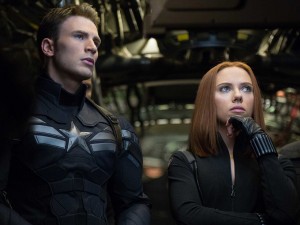Captain America shields audiences
Captain America is unique among superheroes in that he’s a square with sharp edges, an overgrown Boy Scout whose unflappable sense of right and wrong allows him to reject mindless jingoism in favor of higher virtues: bravery, compassion and a fierce sense of moral accountability. Co-created by Joe Simon and Jack Kirby, the character looks like a walking, talking recruitment poster — but on the inside he’s still scrawny little Steve Rogers, sworn to be helpful because he remembers what it’s like to be helpless. From cold-cocking Adolf Hitler on the cover of his first edition in 1941 to leading the Avengers in 2012, Cap has always been one of comics’ most fascinating contradictions: a political idealist disguised as a star-spangled propaganda tool.

Oh captain! My captain! · Captain America (Chris Evans) and Black Widow (Scarlett Johansson) find themselves disillusioned with S.H.I.E.L.D. after the appearance of a mysterious new enemy in Captain America: The Winter Soldier, set to release April 4.
– Photo courtesy of Marvel Studios
Joe Johnston’s 2011 film Captain America: The First Avenger understood this. The movie was a rousing, unabashedly goofy tribute to World War II adventure serials that worked mainly due to the strength of its supporting cast — especially Hugo Weaving as the dastardly Red Skull — and the whiz-bang charm of its period setting. It found our hero, played with true-blue earnestness by Chris Evans, securely in his element: battling clearly defined bad guys such as the Nazi-sponsored terrorist ring HYDRA with his unit of Howling Commandos and making whoopee with the flirty but capable Agent Peggy Carter, played by Hayley Atwell.
The film’s box office haul — $176 million on a budget of roughly $140 million — was relatively modest by superhero standards, but it succeeded in incorporating Cap into Marvel’s cinematic universe, adding a much-needed sense of history and old school heroism to the stories that followed.
Then came Joss Whedon’s crossover opus The Avengers, which flung the gallant super-soldier into the modern world and tasked him with uniting a team of squabbling super-frenemies in time to save New York City from an alien armada led by the power-mad Loki, played by Tom Hiddleston. Some of the film’s early scenes — think of all those broken punching bags — hint at Cap’s struggle to adapt to a time period where most of his loved ones are either dead or languishing in retirement homes, but that existential angst seems to lift the moment he finds another foe to hurl his vibranium shield toward.
Captain America: The Winter Soldier, the newest and most politically conscious Marvel offering to date, refuses to grant our hero the luxury of knowing his enemy, a development that reflects the ambiguity of our own geopolitical reality. With the Battle of New York won and the Avengers effectively on hiatus since the Great Shawarma Summit, Cap has thrown himself into his fieldwork with S.H.I.E.L.D., signing on for increasingly perilous missions that allow for plenty of bonding time with the lithe, lethal Black Widow, played by Scarlett Johansson. When these operations begin calling for pre-emptive drone strikes, illegal surveillance techniques and other ethically dubious measures, an unnerved Cap voices his concerns to Nick Fury, portrayed by Samuel L. Jackson, who fires back with this cryptic response: “S.H.I.E.L.D. takes the world as it is, not as we’d like it to be.”
Many reviews have compared The Winter Soldier to paranoia thrillers from the ’70s such as The Conversation and The Parallax View, both compelling but deeply cynical films that spoke to the American people’s suspicions about the government and other major institutions in the noxious wake of Watergate. These similarities are only reinforced by the presence of Robert Redford, the star of Three Days of the Condor and All the President’s Men, who appears in The Winter Soldier as Alexander Pierce, a Washington, D.C. wheeler-dealer and S.H.I.E.L.D. bigwig whose easy smile hides the banked fires of a zealot. There’s also the eponymous Winter Soldier himself, a brainwashed assassin with an artificial arm and spoiler-heavy ties to Cap’s past. Judging by the trailer, he also wears more mascara than all the members of Green Day combined.
Marvel Studios President Kevin Feige and screenwriters Christopher Markus and Stephen McFeely have all cited Ed Brubaker’s acclaimed run on the comics as a primary influence on The Winter Soldier. Brubaker, a veteran of both Marvel and DC Comics, actually created the character back in 2005 as part of an effort to reinvigorate the series.
This grounded, more character-driven approach might also explain why Feige hired Joe and Anthony Russo — known collectively as the Russo Brothers — to direct the picture. The Russos, whose previous IMDB credits include the forgettable Owen Wilson comedy You, Me and Dupree and TV shows such as Arrested Development and Community, appear to have earned their blockbuster bonafides while filming The Winter Soldier, especially since Marvel has already asked them to helm the newly announced Captain America 3, which is currently aiming for a 2016 release date.
The more things around him change, the more Captain America needs to stay the same. Unlike Batman and Superman, who can support multiple impressions and interpretations, there’s really only one way to present Cap: steadfast yet gentle, hopeful yet honest. He’s not the United States’ mascot, nor was he ever meant to be. He’s the larger-than-life ideal we should all be striving for, regardless of where we come from, free from all labels and the terrors of misunderstanding. As the big man himself once said, by way of writer Frank Miller: “I’m loyal to nothing… except the Dream.”
Landon McDonald is a graduate student studying public relations. His column, “The Reel Deal,” runs Thursdays.


A wonderful review. Thank you.